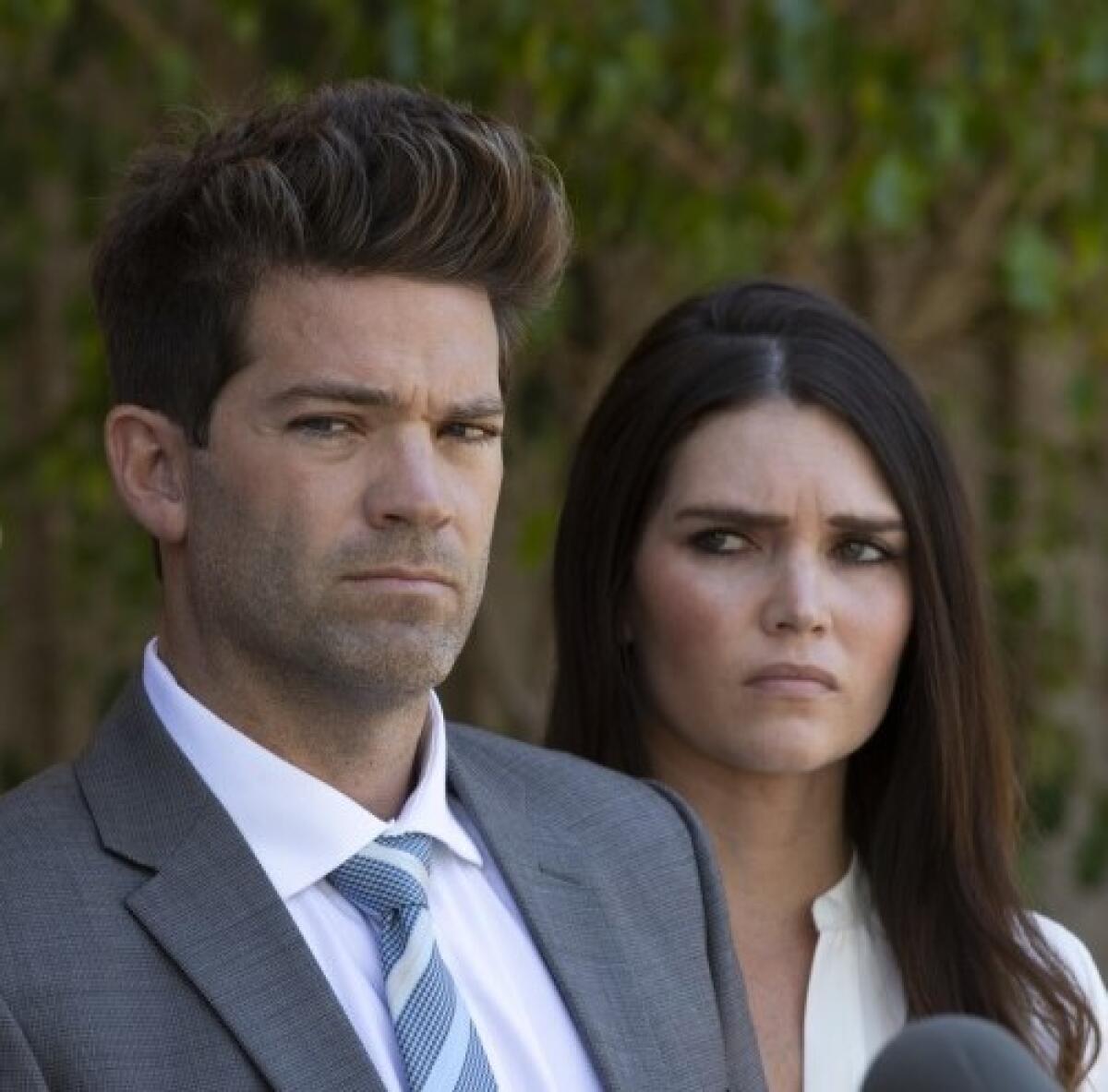Newport Beach doctor, girlfriend were branded sexual predators. Was it a political game?

- Share via
When the case broke in 2018, it immediately became fodder for tabloid headlines around the world.
Orange County prosecutors at the time accused prominent Newport Beach doctor Grant Robicheaux, 39, and his girlfriend Cerissa Riley, 32, of being sexual predators who used their good looks to lure vulnerable women, drug them and take them back to their posh home to sexually assault them.
But on Tuesday, Orange County Dist. Atty. Todd Spitzer announced that he was dropping all charges against the couple, accusing his predecessor and longtime political foe, Tony Rackauckas, of botching the case and making accusations that could not be proved.
“I didn’t create this situation, but it’s my responsibility to fix it,” Spitzer said at a news conference. “Doing justice is not always pretty, and it’s not pleasant many times. This is not pleasant at all, but these are important decisions that affect people’s lives.”
Rackauckas fired back in a statement, defending his handling of the case and suggested the dismissal was a possible “political vendetta against me.”
“Certainly, any prosecutor should think long and hard before dismissing such a case where multiple women have independently come forward and subjected themselves to the hard process of baring their souls to the authorities,” Rackauckas said. “I just hope they’re not being sold down the river for some twisted political motive.”
The shocking reversal leaves many questions:
What was the couple accused of doing?
Robicheaux was charged with sexually assaulting seven women and Riley five. One woman described the couple as a “Bonnie and Clyde” team who drugged her and forced her to engage in sex acts, according to court documents. Robicheaux and Riley had both pleaded not guilty and repeatedly denied having nonconsensual sex with any of their accusers.
The case became political almost immediately.
After charges were filed in 2018, Rackauckas and Spitzer — who were engaged in a heated race for Rackauckas’ district attorney post — held dueling news conferences outside the Harbor Justice Center in Newport Beach. At that time, Spitzer accused his political rival of being slow to file charges and using the case to bolster his profile as his reelection prospects sagged. Spitzer defeated Rackauckas decisively in the November 2018 election.
How did the case unravel?
In October 2019, Spitzer assigned two veteran deputy district attorneys to review all evidence collected after another prosecutor in his office indicated there were “serious proof problems” with the case, Spitzer said.
The review team agreed unanimously that there was “insufficient evidence to prove this case beyond a reasonable doubt,” he said Tuesday.
Over the course of three months, prosecutors reviewed thousands of photographs and videos from computers, hundreds of hours of audio recordings, thousands of pages of documents and tens of thousands of text messages between Robicheaux and Riley spanning a four-year period, Spitzer said.
They also combed through emails from accusers and law enforcement and thousands of conversations between the couple and women on social media and dating sites.
Spitzer said Tuesday that Rackauckas and his staff had manufactured details about the case and repeatedly misstated evidence to garner headlines and further Rackauckas’ reelection campaign.
Spitzer and defense attorneys representing the couple took issue with Rackauckas’ claim during a September 2018 news conference that investigators had “thousands of videos” in evidence that showed there could be “hundreds” or “more than a thousand” victims.
Weeks later, the district attorney’s office in a statement said it “never said all the images are incriminating, sexual in nature or show incapacitation or intoxication.”
In a deposition taken by defense attorneys last year, Rackauckas admitted that he expected to get publicity over the case and that it might be helpful to his campaign.
Late last year, Spitzer asked the California attorney general’s office to consider taking over the case because of a perceived conflict of interest, but state prosecutors declined.
Spitzer said he made the request because of complaints from defense attorneys about the alleged politicization of the case and its effect on the credibility of his office.
“This is not a close call,” Spitzer wrote in the letter to the attorney general. “It is a blatant abuse of power and misuse of government resources for personal gain by the former administration of this office. This office cannot suffer any more credibility setbacks given its history of prosecutorial abuse.”
Where do the defendants go from here?
Philip Cohen, an attorney representing Robicheaux in the case, said the doctor and Riley’s lives have likely been forever altered by the allegations lodged against them.
“I don’t think anyone can truly understand what Grant and Cerissa are going through,” Cohen said. “They’ve gone to bed every night, eaten every meal with the threat of prison hanging over their heads. That has to be an unbelievably devastating way to live.”
What about the women who made the accusations?
Spitzer invited any of the women who lodged allegations against the couple to meet with him to discuss his decision.
He also offered a public apology to the women involved and to Robicheaux and Riley, calling what happened in the case a “travesty.”
Rackauckas said in his statement he feels for them too.
“My heart goes out to the women who had the courage to come forward with their complaint because I believed their complaints based on the evidence I had before leaving office.”
More to Read
Sign up for Essential California
The most important California stories and recommendations in your inbox every morning.
You may occasionally receive promotional content from the Los Angeles Times.













